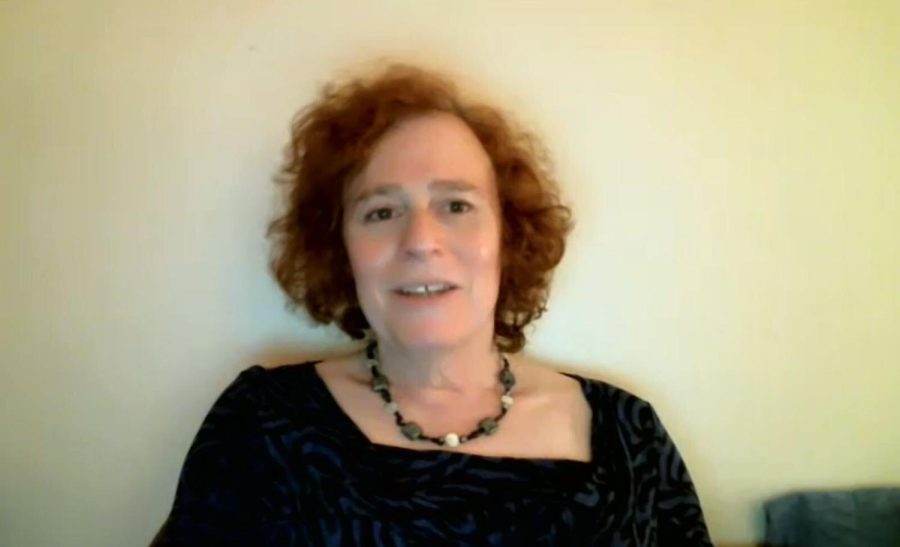Yeshiva professor Joy Ladin discusses poetry, gender transition and Judaism
Joy Ladin, professor of English at Yeshiva University, speaks at “In Our Own Write” hosted by the Center for Creativity on Tuesday.
April 14, 2022
Joy Ladin began her Tuesday evening discussion by introducing a poem she wrote prior to her gender transition called “The Soul Wakes Up on the Wrong Side of the Bed.”
“It’s a poem that I wrote during the long period of time when I was in the closet, which, for me, meant living and writing as a man that I knew I wasn’t,” Ladin said. “You’re trying to write poems that are true and express feeling, but don’t give away who you really are.”
Ladin, a professor of English at Yeshiva University, became the first openly transgender professor at an Orthodox Jewish university in 2008. She spoke at a Zoom event hosted by Pitt’s Center for Creativity for “In Our Own Write,” a Pitt LGBTQ+ creative writing course for people over 50. Ladin read a selection of her poems and offered wisdom on writing and religion in a Q&A.
While discussing her “Transmigration” collection, which she wrote in the midst of her transition, Ladin said those years were marred by anguish and grief — but she survived and persevered.
“Many of the poems in this book were written like, ‘Well, I could kill myself now, or I could write a poem,’ and so I wrote a lot of poems,” Ladin said. “There was this part of me that refused to die during the long years that I wasn’t living as myself — and when I started living it… I wanted to hear what it was saying to me.”
While discussing her poem “Unmourning,” she compared the whirlwind of emotions to the experience of her friend Steven Greenberg, the first openly gay Orthodox Jewish rabbi. As a young man, Greenberg received an HIV diagnosis that he perceived as a “death sentence,” but as treatments evolved, he found it difficult to change his mindset.
“He mourned all these different aspects of his life, each one, one at a time, and then when the drugs came and he started to get better, he couldn’t flick a switch and suddenly be alive. He said he had to ‘unmourn’ all of the things he had mourned and let go of,” Ladin said. “It resonated with me… there had been so many losses, and now I had to ‘unmourn’ to be alive.”
Despite this pain, Ladin said, writers should be motivated by the joy of writing.
“When you’re just starting to write something, try to feel as happy as a three-year-old finger painting,” Ladin said. “It’s that delight in the act of creation — that’s what I think keeps us going as writers.”
Ladin said she had a profound relationship with Judaism growing up as the only devoutly religious member of her household. It grew to be an important presence in her life and work.
“I was hanging out with God. God knew who I was, but God was also like me in some crucial ways. God didn’t have a body. Nobody else could see God was there,” Ladin said. “When I started reading the Bible, I’m like, ‘Yeah, this is a book about somebody like me,’ — somebody who loves people and wants to be there for them, but they can’t see the person.”
In closing, Ladin presented words of wisdom for LGBTQ+ students at Pitt — to persist through hard times and learn from the experiences.
“The most awful parts of my life have given me incredible gifts, but to get those gifts I had to survive them … Our feelings are ours — they’re smaller than we are. The point is to live through them,” Ladin said. “The pain that you survive opens you to resonate with pains someone else is going through … That feeling of otherness that you have? That is a profound experience of being human.”
Erik Schuckers, manager of communications and programming at the Center for Creativity, said he hoped bringing Joy Ladin to Pitt would help foster conversations about intersectionality.
“I think it’s really important to encourage intergenerational dialogue on campuses,” Schuckers said. “Our stories and experiences as queer folks often get siloed by age, race, religion, socioeconomic status.”
Susan Blackman, who graduated from Pitt in 1977 and participates in “In Our Own Write,” said Ladin represents the intersection of her queer and Jewish identities.
“She inspires me because I’m Jewish and I love to see ways that the various sects of Judaism — including the Orthodox — have been able to accept differences among the Jewish people,” Blackman said. “In particular, I am always struck that Torah says that God created humankind in God’s own image… In other words, there’s no ‘wrong’ since we are all created by God.”
Ladin’s story symbolizes an unending fight for progress, Schuckers said.
“[Ladin’s] struggle helped to open one more door for queer folks, but it’s critical to remember that open doors can be shut again and that progress is not guaranteed,” Shuckers said. “I think we’re getting a sense of that now with the current wave of anti-queer legislation.”
Schuckers found one of Ladin’s poems particularly inspiring, encouraging the reader to embrace “reinvention” in the face of adversity.
“One of my favorite Joy Ladin poems is ‘Survival Guide.’ It speaks to the joy of invention, or reinvention, without minimizing the risks and discomfort that comes along with it, but affirming the joy and the power,” Schuckers said. “The title of the poem is grim and apt, tragically, for our times – trans folks’ ‘survival’ is under attack almost everywhere – but the poem itself is a call to arms: ‘turn yourself into / the real you / you can only discover / by being other.’”








